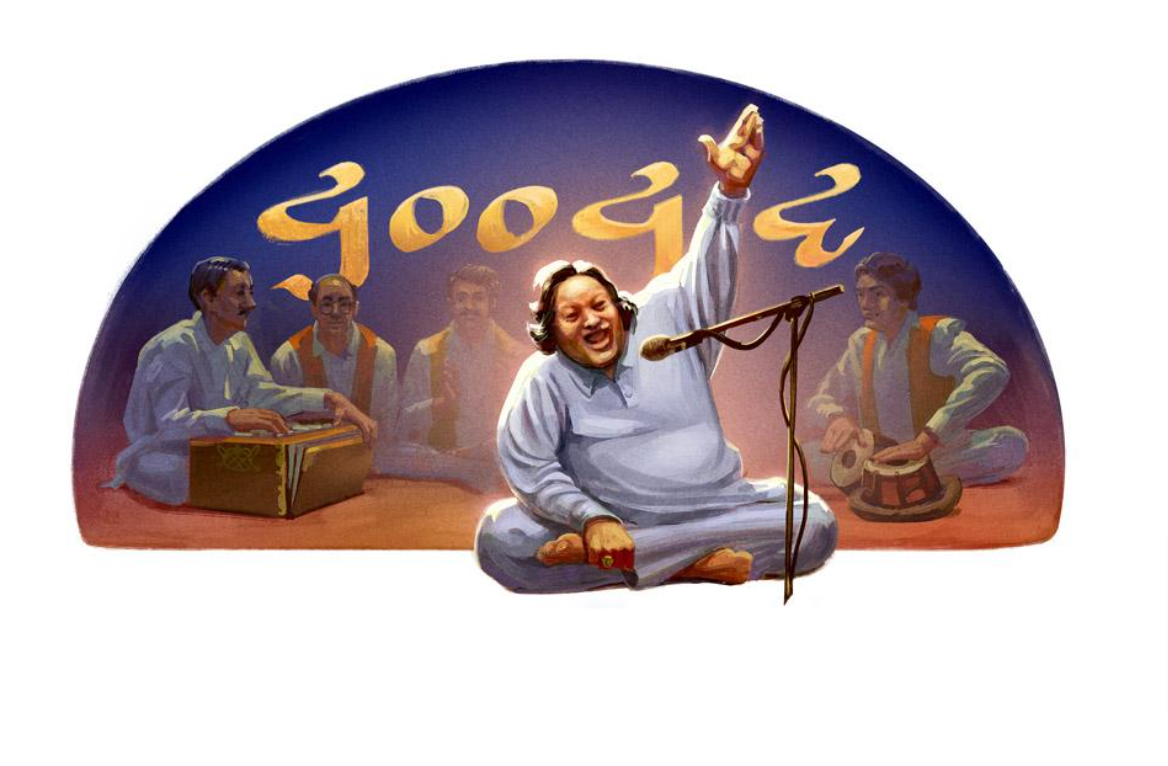Nusrat Fateh Ali Khan
Overview of Nusrat Fateh Ali Khan’s legacy
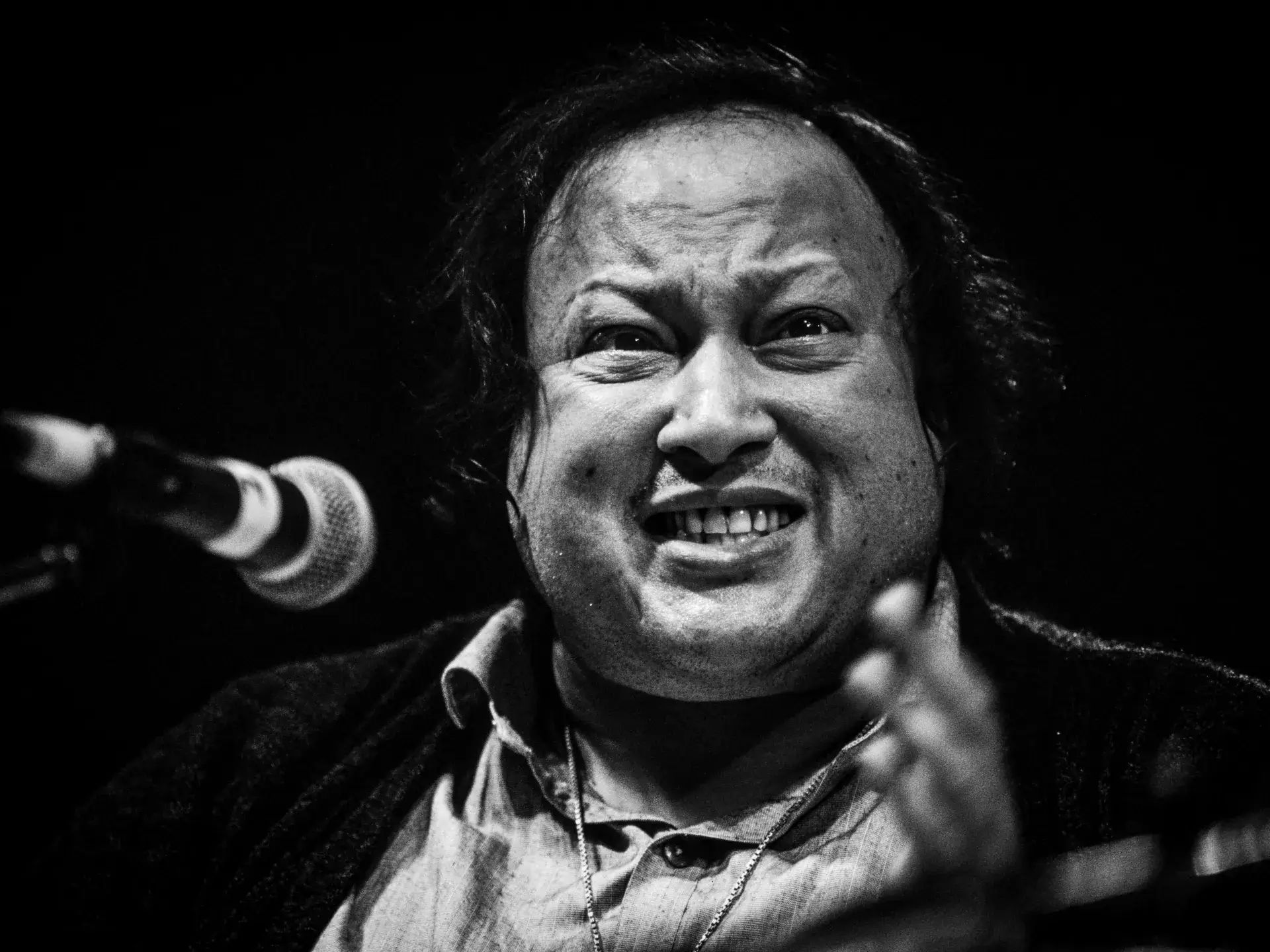
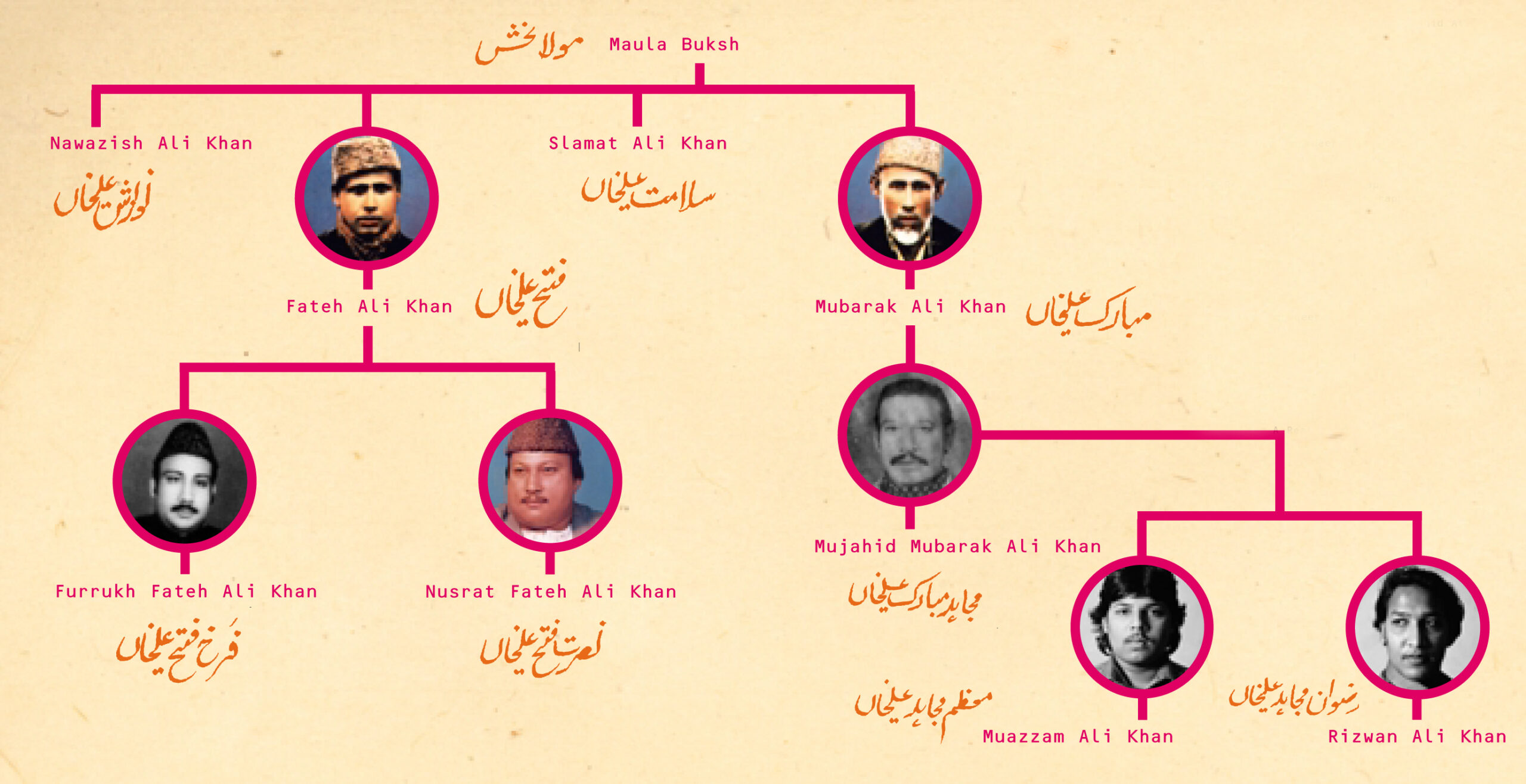
About Nusrat Fateh Ali Khan
Birth and family background
Rise to Fame
01
Early Performances and Breakthroughs
International Recognition and Collaborations
02
03
Influential Recordings and Albums
Famous Works





Ustad Nusrat Fateh Ali Khan, widely regarded as the “Shahenshah-e-Qawwali” (King of Kings of Qawwali), was a Pakistani musical legend known for his mastery of qawwali, a Sufi devotional form of music. Born on 13 October 1948 in Lyallpur (now Faisalabad), he was raised in a family with a rich musical heritage. Khan revolutionized qawwali by infusing it with elements of Hindustani classical music and his distinctive style of sargam, khayal, and rhythm.
Khan’s first public performance came at the age of 15 at his father’s chelum, and he became the head of his family’s qawwali party in 1971. Over his career, he gained global acclaim, introducing qawwali to international audiences and collaborating with Western artists. His ability to perform with incredible vocal stamina, often for several hours, set him apart. By the 1980s, he had signed with Oriental Star Agencies in Birmingham, which led to the release of albums and movie scores across various regions, including Europe, India, Pakistan, Japan, and the U.S.
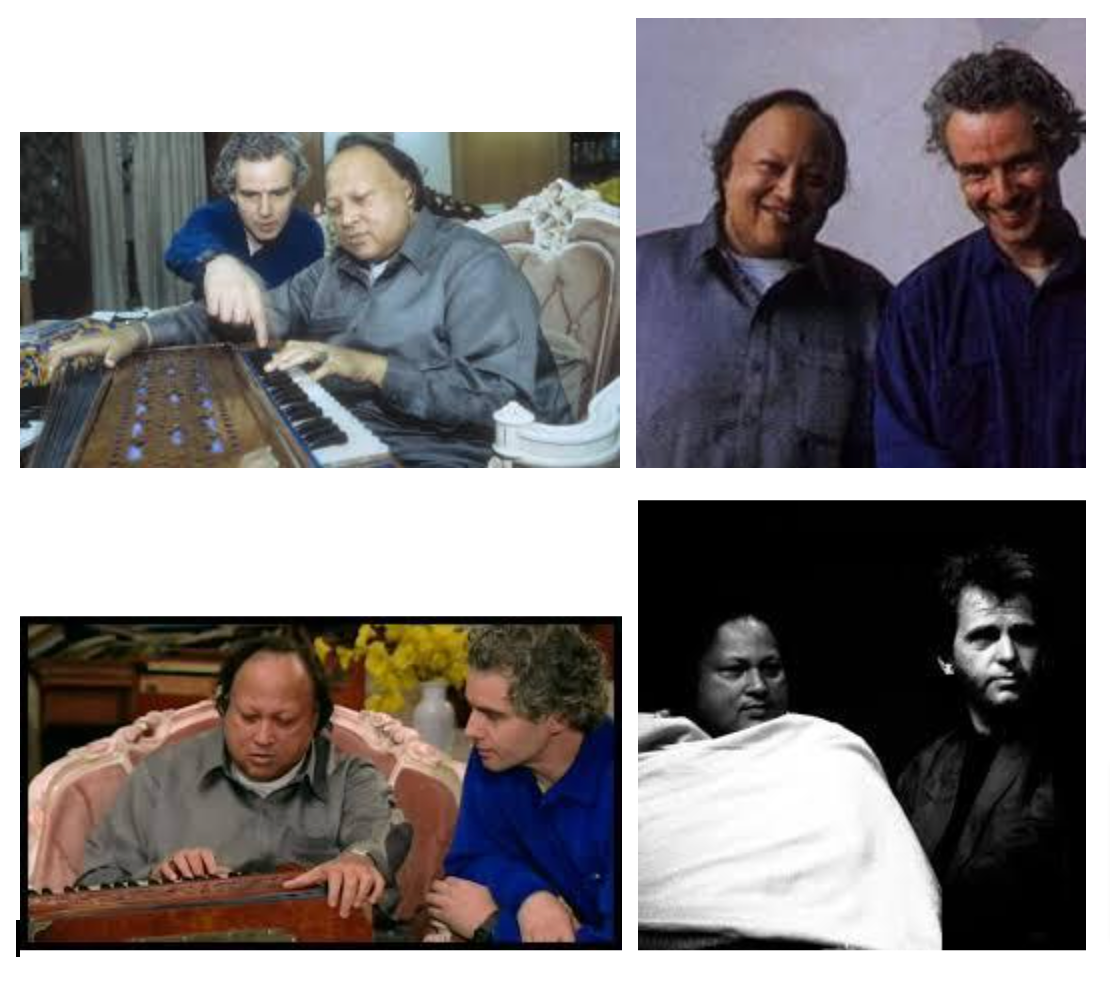
Pictures of Nusrat with Peter Gabriel
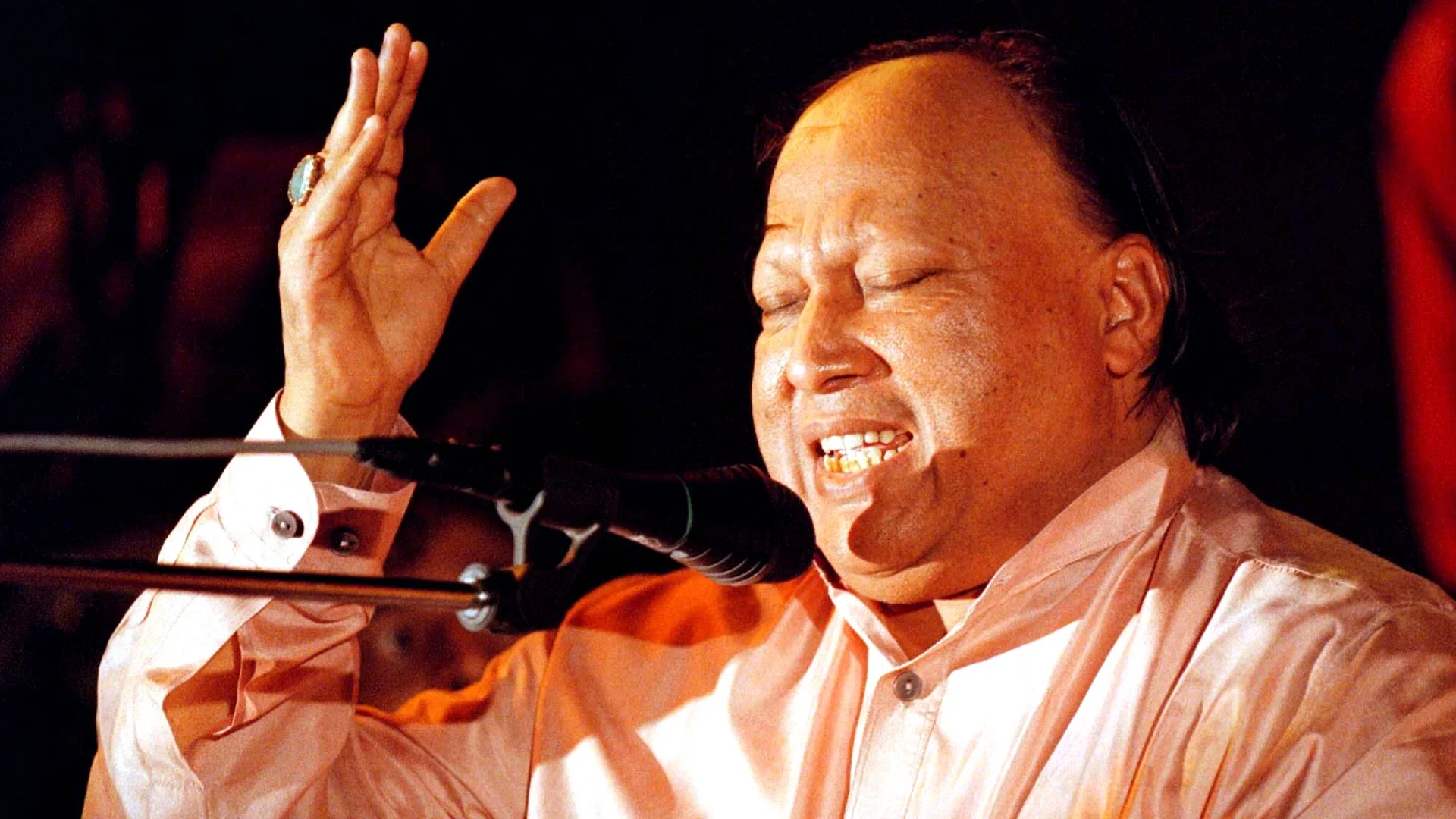
Beyond his impact on qawwali, Nusrat Fateh Ali Khan played a pivotal role in shaping South Asian popular music, influencing genres like Pakistani pop, Indian pop, and Bollywood music. His music transcended cultural and geographical boundaries, earning him a reputation as one of the greatest vocalists in the world, recognized even by international publications such as The New York Times and LA Weekly. His death on 16 August 1997 marked the end of an era in Sufi music, but his legacy continues to inspire musicians globally.
Khan’s experimental works, such as Mustt Mustt (1990) and Night Song (1996), and his collaborations with artists like Eddie Vedder and Michael Brook cemented his reputation as a world music pioneer. He contributed to Bollywood soundtracks, with notable works including Aur Pyaar Ho Gaya and Kachche Dhaage, along with several Pakistani films.
Khan’s untimely death on 16 August 1997 due to cardiac arrest in London marked the end of a phenomenal career. His influence on both traditional and contemporary music is unparalleled, and his legacy is carried on by his nephews, Rahat Fateh Ali Khan and Rizwan-Muazzam.
Throughout his career, Khan received numerous prestigious awards, including Pakistan’s Pride of Performance in 1987, UNESCO Music Prize (1995), and Grammy nominations in 1997. He was posthumously awarded honors like the UK Asian Music Awards’ “Legends” Award and holds the Guinness World Record for the most qawwali recordings. Renowned globally, Khan was described as the “Singing Buddha” in Japan, the “Voice of Paradise” in Los Angeles, and the “Pavarotti of the East” in Paris, solidifying his position as one of the greatest singers of all time.
Nusrat Fateh Ali Khan is often credited as one of the key figures in the development and popularization of “world music,” particularly through his efforts to introduce the mystical art of qawwali to global audiences. Before Khan, qawwali was often seen as an “arcane religious tradition” largely confined to the Sufi spiritual context in South Asia. However, Khan’s distinctive style, spiritual energy, and powerful voice transformed it into a global phenomenon.
His mesmerizing performances, which could last for hours, captivated audiences across Europe, the U.S., and beyond. His vocal range, depth, and unmatched improvisational skills left listeners spellbound, whether they understood the language or not. Alexandra A. Seno of Asiaweek encapsulated Khan’s impact by saying that his “voice was otherworldly” and that his performances of qawwali were unlike anything from his generation. His sheer intensity and vocal prowess were unparalleled, turning his performances into transcendent experiences.
Khan’s success in fusing traditional Sufi music with contemporary global sounds contributed to a broader acceptance of non-Western musical traditions in the West. His collaborations with Western artists and musicians further solidified his role as a pioneer, bridging cultural and musical divides, and establishing him as a foundational figure in the rise of “world music” as a recognized genre.
Nusrat Fateh Ali Khan’s influence on both Eastern and Western music is vast, inspiring a wide range of artists across genres. Jeff Buckley, a notable admirer, famously said, “He’s my Elvis” and often performed parts of Khan’s qawwali “Yeh Jo Halka Halka Suroor Hai” during his live shows. Other artists, including Zayn Malik, Nadia Ali, and producers like Malay, have also cited Khan as an influence, demonstrating his reach into contemporary music. Peter Gabriel, who collaborated with Khan on various projects, and A. R. Rahman, one of India’s top composers, frequently acknowledged Khan’s impact on their music.
Prominent figures in popular culture, including Mick Jagger, Amitabh Bachchan, and Susan Sarandon, admired his work, with Sam Harris naming him one of his favorite musicians. The fusion of Khan’s qawwali with Western music was further explored by bands like The Derek Trucks Band, who covered Khan’s songs in multiple albums.
Tribute projects like Brooklyn Qawwali Party (a New York-based jazz group) and Gaudi’s 2007 album Dub Qawwali, which reimagined Khan’s vocals in an electronic setting, continued to celebrate his legacy. Gaudi’s work even reached top spots in global electronic charts and earned a nomination for the BBC World Music Awards.
Khan’s impact extended to literature and art. A 2015 Google Doodle celebrated his 67th birthday, acknowledging him as the person who “opened the world’s ears to the rich, hypnotic sounds of the Sufis.” In 2018, Pakistani-American poet Faisal Mohyuddin paid tribute to Khan in his poem “Faisalabad,” which evokes the emotional power of Nusrat’s music as a remedy for homesickness.
Nusrat’s influence permeates not just music but also cultural expressions, showing how his unique vocal style, deeply rooted in Sufi tradition, continues to resonate across generations and borders.
